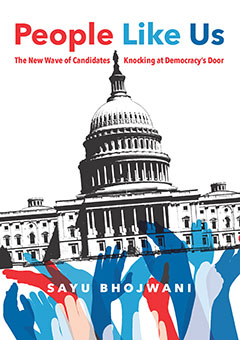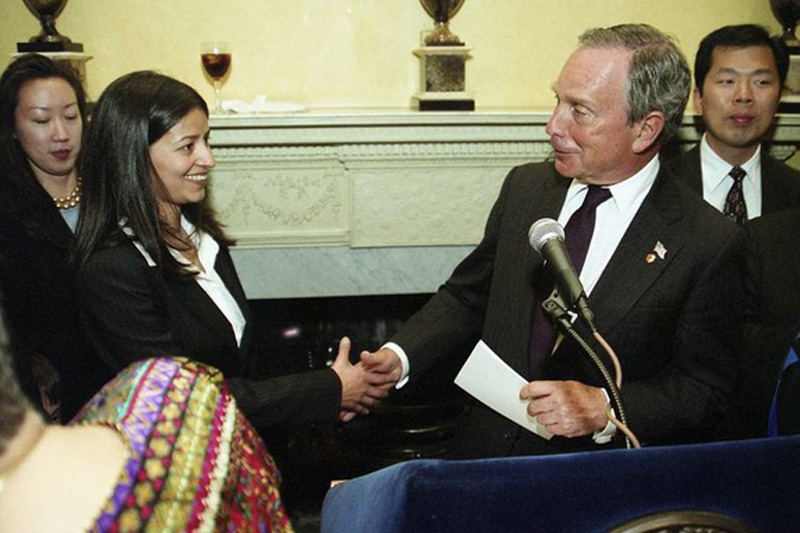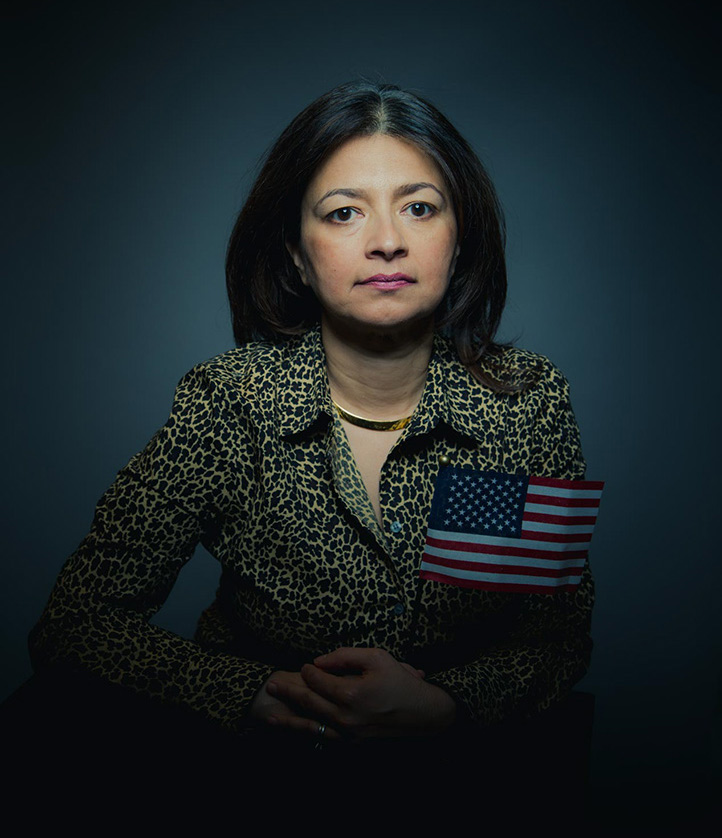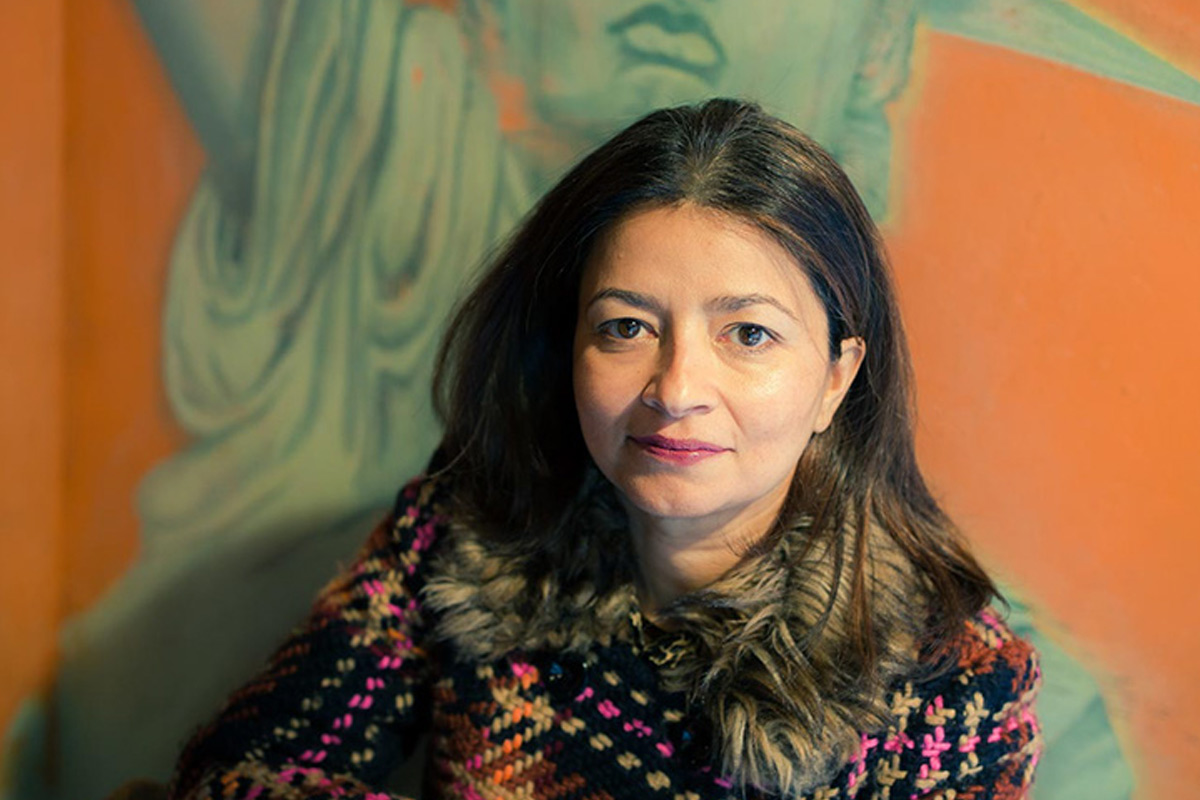In 1988, soon after graduating from Teachers College, Sayu Bhojwani was hired at Macmillan Publishers to work on the company’s prestigious Norton Anthologies series. For Bhojwani, a self-described introvert who’d majored in English, it was a dream job.
“I’d spent my childhood with my nose in books, and now I could do that for a living,” she says.
Her parents – immigrants from India who lived in Belize – were happy, too
“They didn’t understand publishing, but they knew the name ‘Macmillan,’ and they felt I was going to be financially secure.”
An hour after Bhojwani showed up for her first day of work, the dream abruptly ended. The human resources office took one look at her F1 visa, which is given to international students at U.S. academic institutions, and told her to go home. And just like that, she was done.
It would take several more years, a succession of jobs that ranged from “less than ideal” to an appointment in City Hall, and, ultimately, a doctorate from Teachers College, before Bhojwani (Ph.D. ’14) fully embraced a very different kind of life. But that morning at Macmillan clearly helped contribute to her dawning realization that, as she puts it in a widely viewed 2016 TED Talk, “the door that I thought was open was actually just slightly ajar – the door of America that would open wide if you had the right race, the right skin color, the right networks, but could just slam in your face if you had the wrong religion, the wrong immigration status, the wrong skin color.” In a country she had thought of as her home, Bhojwani says, she had come to understand that she was among the 84 million immigrants or children of immigrants whose dream “must always be rewritten or repurposed.”
Knocking on the Door
Bhojwani’s own “rewrite” is another story entirely – one that grows more inspiring each November. In 2010, she founded the nonprofit New American Leaders (NAL), which recruits and prepares first- and second-generation Americans to run for elective office. Since then, NAL has trained more than 600 candidates, and this past fall, in races in New York, Arizona, Colorado and Michigan, 18 of them claimed seats in state assemblies, city councils and local school boards.

DEMOCRACY’S DOOR Bhojwani’s book, People Like Us: The New Wave of Candidates Knocking at Democracy’s Door, released in October 2018.
As Bhojwani explains in her highly praised book, People Like Us: The New Wave of Candidates Knocking on Democracy’s Door, published in October by The New Press, NAL teaches candidates to do three things: tell their personal story to all types of voters; mobilize immigrant communities that historically lag in voter participation; and ask for money as an investment not just in campaigns but in communities.
For NAL alumna Catalina Cruz, who recently won a seat representing her neighborhood of Jackson Heights, Queens, in the New York State Assembly, “demystifying the money” was key.
“The psychology of immigrants and women of color is that you don’t talk with people outside of the house about financial issues,” recalls the Colombian-born Cruz, a former top aide to a ranking member of the New York City Council and a longtime advocate for the DREAM Act – Congressional legislation that would grant residency to millions of undocumented immigrants who, like her, came to the United States as children. (She has since become a citizen.)
Prepped by Bhojwani and NAL trainers, Cruz says she ultimately raised nearly $200,000 – enough to win a hotly contested September primary en route to becoming just the third DREAMer in the nation to gain elective office.
Irvine, California City Council member Farrah Khan believes she became the first Muslim-American woman to win office in California’s historically conservative Orange County precisely because she embraced her identity and made it part of her core narrative.
“You don’t realize that the best connection you make with people is when you share with them where you come from and who you are,” says Khan, who is also an NAL alumna. She now begins her speeches with the story of her arrival in the United States at Chicago’s O’Hare Airport, where she became so terrified by her first escalator ride that she let go of her mom’s hand. They were separated until a stranger saw that she was in tears and led her to safety.
“I use that as a pivot moment – when you see something wrong or that someone needs help, if you don’t step in and be the person who helps, what are we really doing in our lives?” Khan says. Bhojwani, she says, has been that person for her and many others – “a trailblazer” who helps people navigate to where, politically, they need to go. “Going through the whole process, she was someone that I could reach out to.”
Acting from Necessity
If you ask Bhojwani how she reinvented herself – how she learned to hold trainings and mentor others; form partnerships with more than 34 organizations around the country; create a national advisory board; win backing from funders that include Coca-Cola, the Rockefeller Brothers Fund, the W.K. Kellogg Foundation and the Open Society Foundations; and speak at conferences around the world – her answer is, “Because I needed to.”
“My family has included refugees, immigrants, people living under colonization, people who are undocumented,” she says. “We’ve had all kinds of visas and all kinds of statuses.” Both her parents were children in 1947 when Britain’s partitioning of India forced them to move over the border to Pakistan. Decades later, moving to Belize (then British Honduras) when Bhojwani was four, they again became British subjects “So I embody many aspects of the immigrant experience, and all my work has been about creating a space where people like me can belong.”
My family has included refugees, immigrants, people living under colonization, people who are undocumented… I embody the immigrant experience, and my work has been about creating a space where people like me can belong.
—Sayu Bhojwani
In Belize City, where her father opened a dry goods store, Bhojwani recalls that the mix of Hispanic, black, indigenous peoples and Indian immigrants ensured that “my experience of the world was culturally and ethnically diverse, and that I understood diversity was a strength.”
However, New York, where Bhojwani arrived in 1987 as a pre-service teaching student – the first of her three stints at Teachers College – stood in stark contrast. The city was reeling from the Central Park jogger case and the killings of black men by white mobs in Howard Beach and Bensonhurst. Bhojwani found herself questioning how non-white university students were perceived and taught. She completed her master’s degree, but, in something of a replay of her Macmillan experience, gave up on a teaching career after the New York City Department of Education declined to help her obtain a green card. She was, by her own admission, “floundering,” when, in 1996, in the basement of a church in Queens, she founded an afterschool program called South Asian Youth Action, which offered academic and college support, storytelling, and other forms of identity affirmation to teens with ancestry in countries such as Afghanistan, Bangladesh, the Republic of Bhutan, Guyana, India, Nepal, Pakistan, Sri Lanka, Tibet, and Trinidad and Tobago.
After five years, already mulling broader possibilities for helping immigrants, she enrolled again at Teachers College for a doctorate in Politics & Education. And then, on her first day of classes – September 11th, 2001 – the world turned upside down.
“The attacks sent shock waves through my community and changed the immigration landscape for decade to come,” she says in her TED talk. “People were experiencing harassment at schools, workplaces, airports. Yong people I had worked with were being harassed – not just by classmates, but also by their teachers. My husband – then boyfriend – thought twice before he put a backpack on or grew a beard because he traveled so much.”
At the Table
But there were other reactions, too. In the city’s elections after the attacks, voters approved a ballot initiative to create a new post, the Commissioner of Immigrant Affairs. Five months later, the new Mayor, Michael Bloomberg, appointed Bhojwani to the job. Her stint at City Hall was brief but eventful: She helped expand protections for undocumented immigrants living in the five boroughs, improved language access for non-English speakers and created new protections for domestic workers, who were predominantly immigrants.

COOLER HEADS After 9/11, New York City Mayor Michael Bloomberg appointed Bhojwani to the newly created post of Commissioner of Immigrant Affairs.
Perhaps even more importantly, she learned two key lessons. The first was that “well-meaning New Yorkers in city government had no idea how scared immigrants were of law enforcement – that if you’re an undocumented parent, every day when you say goodbye to your child, you don’t know what the chances are that you’re going to see them at the end of the day, because a raid at your workplace, a chance encounter with local police, could change the course of your life forever.” The second would become, in essence, the founding premise of New American Leaders: that “when people like me, who understand that fear and who have learned a new language and navigated new systems, were sitting at the table, we advocated for our communities in a way that no one else could or would.”
When people like me, who have learned a new language and navigated new systems, were sitting at the table, we advocated for our communities in a way that no one else could or would.
—Sayu Bhojwani
Clearly NAL has been making headway toward that goal, and it isn’t doing so alone: witness the elections this past year of Congresswoman Alexandria Ocasio-Cortez, the emergence of the Green Democrats, and other recent developments. Still, voter turnout remains low among Latinos and Asian Americans, and members of these two immigrant groups – the nation’s largest – hold only a tiny percentage of America’s 500,000 state and local offices.
In People Like Us, Bhojwani offers new ideas for changing that picture, including that “building civic infrastructure” is just as important as recruiting and training potential candidates. “There has to be something that creates vertical opportunities, she says. “Term limits, public financing, single-member districts. Some of those factors have to be there or it’s difficult for somebody to get elected.”

BANNER OF CHANGE Truly representative government won't happen as long as immigrants are seen as “not quite American," Bhojwani says. But bringing about that change will require “a strategic and cultural shift that neither Democrats nor Republicans have yet begun.”
But she also believes that the roadblocks America has created to truly representative government will remain as long as immigrants are seen as “not quite American, or as appealing only to a base of voters who look like they look.” Bringing about that change, she says, requires “a strategic and cultural shift that neither Democrats nor Republicans have yet begun.”
Thus far that shift has been more the work of educators than politicians, an idea Bhojwani may have in mind as she ponders her own future. She’s definitely thought about running for office herself, but isn’t sure she has a local base of voters to draw on, given that her work has been mostly national.
Also, she says, “I’m a super introvert – being with people all the time is exhausting, and at least right now I can shut it off. The electeds in our network have the hardest job. They’re on the front lines, twenty-four seven. I’m behind the scenes.” She is content with that role and with spending time with her 13-year old. “My biggest hero right now is my kid, who has a kind of fearlessness and purity of opinion that’s unfiltered by societal expectations.”
You’re scared I’m going to take away your place at the table, and I’m scared I’m never going to get a place…But I’ve fought to be in this country, and I continue to do so.
—Sayu Bhojwani
Maybe Bhojwani will yet become the scholar and teacher she once dreamed of being. Regardless, it seems clear that her goals will remain the same – and that she, too, isn’t going to pull any punches.
“We never know what putting a new factor in the equation will do,” she says at the end of her TED talk. “You’re scared that I’m going to take away your place at the table, and I’m scared I’m never going to get a place at the table. But I’ve fought to be in this country, and I continue to do so. I know there are millions of immigrants just like me – in front of me, behind me, all around me.
“It’s our country, too.”
[Read more about Sayu Bhojwani, her work and her new book, People Like Us: The New Wave of Candidates Knocking on Democracy’s Door.]
